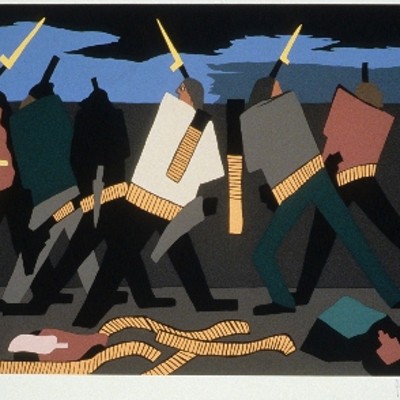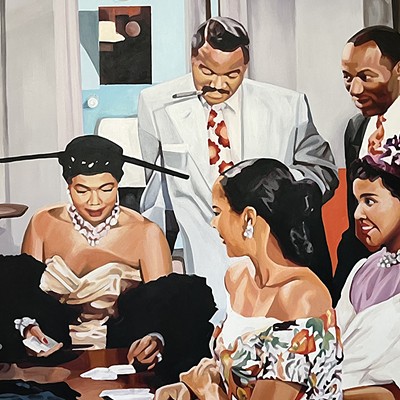Like the great Russian playwright, Foote finds the tiny moments that reveal great human truths. Women in Chekhov talk endlessly of the trip to Moscow that will never come. Texans in Foote talk quietly about a missing grave. Tragedy ripples just below the placid surface of Foote's characters' small-town lives, and the playwright is always sure to find it. But he's just as quick to honor the power of steady love.
The Foote play 1918, newly opened at Live Theatre Workshop, is set in a momentous year in American life. An influenza epidemic sweeps the nation, killing people by the hundreds of thousands. And "Over There," in Europe, as the play's song has it, American boys are dying in the fight against Kaiser Wilhelm.
A small-town Texas family is Foote's window into the deadly chaos. Horace and Elizabeth Robedaux are the happy young parents of a little girl, Jenny, and most of the play's understated actions take place in their tidy, middle-class living room and bedroom. These carefully wrought period rooms, full of lace doilies, carved furniture and even a piano, speak of solidity and prosperity.
In the opening scene the living room set is on stage, but the actors clearly are in the local cemetery, a disquieting portent of the death and disorder to come.
Horace, beautifully rendered by Richard Ivey, has gone to the cemetery in search of the unmarked grave of his father, buried some 16 years before when Horace was a boy of 12. Even Sam the gravedigger (Michael Kirwin) doesn't know quite where the body lies. The lost father is a dislocation at odds with Horace's delight in his own paternity, and it hints at a past far less orderly than his current life as solid merchant and husband.
Horace has worked hard to achieve what he has, but the war threatens to upend his happy menage. Elizabeth's dissolute brother, Brother (Cliff Madison), is eager to go off to the front, and her father, the self-righteous Mr. Vaughn (Mitch Etter) is obstinately eager to send his daughter's young husband along for the ride. The flu, though, will prove a far more insidious enemy than the "Hun" that Brother is so eager to slaughter. This plot, slender as it is, moves into tragedy, but so slowly that the audience is almost caught unaware. And in typical Foote fashion, the playwright reveals the greatest disaster only after the fact, in conversation--nothing is seen onstage.
One of nine plays in Foote's Orphan's Home Cycle, 1918 is based loosely on the lives of Foote's own parents and set in fictional Harrison, Texas, a stand-in for his real-life hometown of Wharton. Two years ago, Live Theatre Workshop staged Cousins, another play in the cycle, which takes place after the events in this one. LTW apparently is stepping into the Foote shoes left by the Tucson Art Theatre, which frequently performed the Texan's works and even brought the great playwright to town for a conference back in 1995.
If LTW is not quite up to the acting strength of the late, lamented Tucson Art Theatre, director James Mitchell Gooden brings a lot of heart to the production. Linda Andresano has outfitted the large cast of 12 in costumes elegantly evocative of the period. Ivey, who played Horace in LTW Cousins, makes a fine Horace here; steady and quiet, he projects great depth of character. Valerie Feingold is affecting as his wife, Elizabeth, but she's a bit too girlish, even naïve, for the part. Cliff Madison does a fine turn as the rascally Brother, but Joan Van Dyke is too fluttery as Elizabeth's mother, Mrs. Vaughn, and Mitch Etter too foolish as her father. Foote's spare dialogue can sum up a whole lifetime of emotions in a single phrase, but it requires actors of sufficient gravitas to flesh it out. Otherwise the words become cartoonish instead of profound.
But 1918 is too moving a play to suffer overmuch from these limitations. It's a compassionate work that steps deftly from tragedy to redemption. Like the Academy Award-winning Foote screenplay of the same name, it dispenses tender mercies to its suffering characters.














